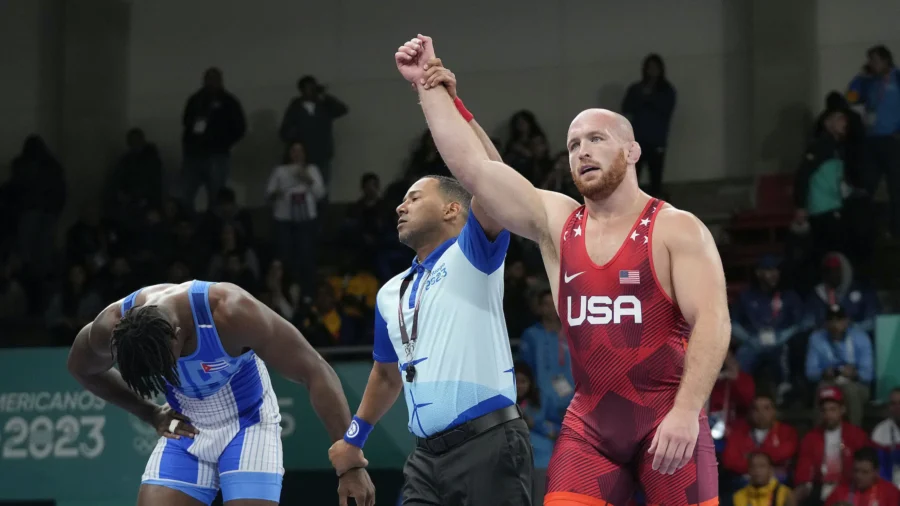American wrestler Kyle Snyder is hoping to become the fourth American to win two golds in Olympic wrestling, as the 28-year-old heads to the Paris Olympic Games.
Aged just 20, he won a gold medal at the 2016 Rio de Janeiro games, and silver at the 2021 Tokyo games. He was also a three-time NCAA champion at Ohio State, and has won three World Championships.
Mr. Snyder is now looking to add to his achievements at the Paris Olympics. If he were to win gold in the 97-kilogram freestyle category, he would join George Mehnert, John Smith, and Bruce Baumgartner as the only American two-time gold medalists in the sport.
He says he’s in top form heading to Paris.
“My body feels stronger and in better condition than it’s ever been,” he said. “So I feel really good. And technically, I’m getting better and better and focusing on the right things in practice.”
Mr. Snyder has also enjoyed success in the years since Tokyo, winning a world championship in 2022 and claiming bronze at the 2023 worlds.
He won’t have an easy path back to the top of the podium, however. He may have to contend with 21-year-old Akhmed Tazhudinov of Bahrain, who defeated him 10-0 on his way to the world championship in 2023.
Mr. Snyder said the 6-foot-2-inch Tazhudinov is a technically sound defensive wrestler who excels at taking advantage of his opponents’ mistakes.
“He just wrestles in a lot of weird positions and scrambles well,” Mr. Snyder said. “He’s able to think while he’s on the mat and make adjustments.”
U.S. men’s freestyle coach Bill Zadick said Mr. Snyder is at his best when challenged.
“I think Kyle Snyder is the type of guy that thrives at that opportunity and that challenge,” Mr. Zadick said. “He wants to be the guy that has the toughest road, the greatest competition. And he wants to be the guy. He likes to test himself. He likes to know where it’s at.”
Olympic wrestling comprises two separate disciplines: Greco-Roman wrestling, a wrestling style where competitors can only attack opponents above the waist, and freestyle wrestling, a more open and modern format.
The final of the men’s 97-kilogram freestyle category, in which Mr. Snyder will compete, is scheduled for Aug. 11.
Mr. Snyder believes he will be prepared, regardless of the opponent. He said he became a dominant wrestler because he challenged the best in practice along the way.
“Ever since I was a kid, I always thought I was going to win in everything I ever did,” he said. “I don’t know why I felt that way. I wrestled people that were older, better and stronger and bigger, and they kicked my butt. And then the next time we wrestled, I’d think I’d win. And then they kicked my butt. And we did that for a long time, and eventually I’d catch up to them.”
Mr. Snyder adds a high level of intelligence to exceptional physical tools and his willingness to be tested. Mr. Zadick said that even when Mr. Snyder was a teenager, he was “like a 30-year-old pro, 28-year-old pro, trapped in a 17-year-old body.”
“He’s really sharp, really smart,” Mr. Zadick said. “I think he’s thinking in an innovative way and adding new things to his style and being creative. And so, I’m excited for him. He just loves that. He loves what he does. And he’s just full of passion, and that’s exciting. And I think it bodes well for anybody that has that kind of drive and fire inside them.”
Abdulrashid Sadulaev of Russia beat Mr. Snyder for gold in Tokyo, but he will not take part in the Paris Olympics, due to his being banned by United World Wrestling (UWW), the sport’s governing body. He was barred from Olympic qualifiers in April by the UWW for supporting Russian’s war in Ukraine. As a result, the International Olympic Committee (IOC) did not include Mr. Sadulaev in its list of eligible athletes from Russia and Belarus.
To date, the IOC has approved 14 athletes from Russia and 11 Belarusians—all with neutral status—to compete at the Paris Olympics.
Neutral status means that the athletes will not compete under the Russian flag, and will instead be allotted the French acronym AIN—for Individual Neutral Athletes. The Russian colors and national anthem are also barred. Russia and Belarus are also barred from team sports at the Paris Olympics.
The AIN selection is based on whether the athlete has expressed support for Russia in its Ukraine war, or had ties to the Russian military.
The Associated Press contributed to this report.

